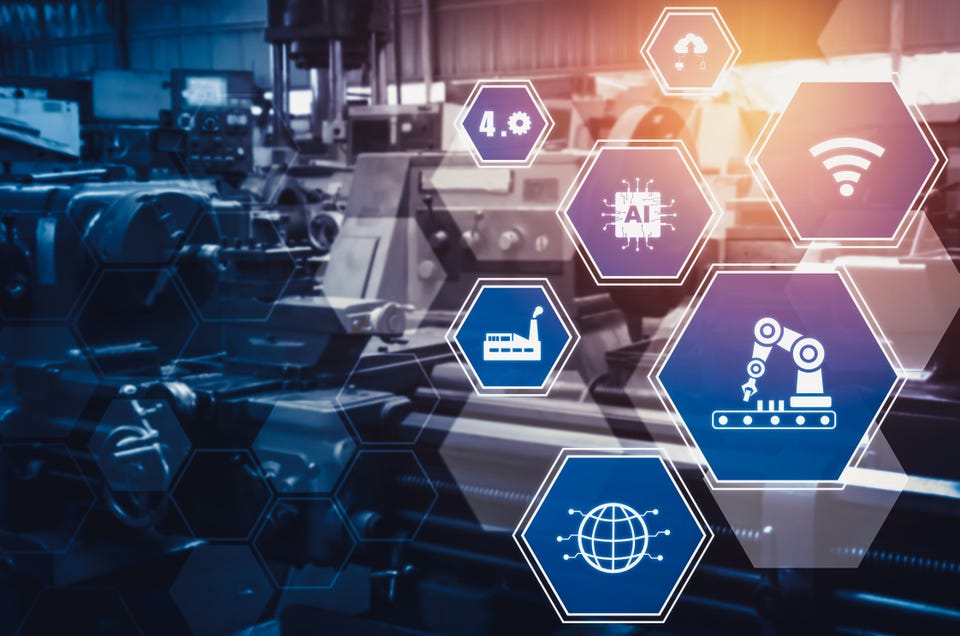Innovation What’s Next For Industry 4. 0: Sustainable Manufacturers In The Midmarket SAP BRANDVOICE Storytelling and expertise from marketers | Paid Program Sep 15, 2022, 02:17pm EDT | Share to Facebook Share to Twitter Share to Linkedin Industry 4. 0 can help midsize manufacturers gain critical business-wide insights needed to negotiate trade-offs that can make a difference for the business, customers, and the environment.
getty By Judy Cubiss, Director and Global Marketing Lead for Industrial Manufacturers, SAP Midsize industrial manufacturing companies have always focused on running highly efficient operations while keeping costs as low as possible. But given current economic and industry conditions, many are beginning to see their traditional Industry 4. 0 investments in a new and more strategic light.
Facing a short supply of raw materials, subcomponents, labor, and financial resources, midsize industry players recognize that sustainability can help them grow revenue, improve operational efficiency, and mitigate risks, according to SAP Insights research. And they are looking to the application of Industry 4. 0 technologies and practices – including the Internet of Things, process automation, artificial intelligence, machine learning, and virtual and augmented reality – to drive this new shift in strategy.
This application of Industry 4. 0 poses an exciting opportunity in a marketplace where customers want value-added experiences and reliable outcomes from the smart equipment and products they purchase. Catalyzing sustainable business models Sustainability has certainly become more important to customers.
For that reason, industrial manufacturing companies are amplifying the value of their Industry 4. 0 investments by going beyond business model efficiency and cost reduction to facilitate a broader responsibility to the environment. Prioritizing sustainability may seem at odds with traditional mandates for high efficiency and low costs.
However, considering midsize manufacturers often have much smaller profit margins and inventory buffers than their larger competitors, this shift can help safeguard the supply chain from unnecessary operational disruptions. MORE FROM FORBES SAP BrandVoice: New Strategies Inspire Big Growth For Manufacturers With Smaller Footprints By SAP Guest Think about the millions of devices, components, and large machines produced, sold, and installed in the field. Tracking and tracing consumer electronics such as smartphones and TVs may be relatively simple with embedded SIM cards and serial numbers.
But industrial equipment requires much deeper monitoring to know where products are located, where every component was sourced from, and whether rare materials and components are disposed of safely or should be recovered, refurbished, and reused. With Industry 4. 0 technologies, this approach to reverse supply chain logistics can help businesses navigate current constraints on some raw materials and subcomponents with tremendous speed, clarity, and intelligence.
It delivers more visibility to the supply chain, unraveling process complexity and bringing hidden opportunities and risks to light. As a result, organizations can operate with the deep, data-driven insights they need to make informed and effective decisions when making trade-offs between costs, supply availability, and environmental impact. MORE FROM FORBES SAP BrandVoice: Is Your Factory Intelligent Enough To Withstand The Next Business Crisis? By Susan Galer In addition, industrial manufacturers can become more responsive to internal and external shifts as decision-making capabilities are brought closer to the plant floor and the customer location.
This improvement is made possible by automating routine processes based on predefined business workflows and tolerances and capturing and analyzing performance status data from factory machines and installed equipment in real time. Moving forward without neglecting what matters most While no two midsize manufacturers are precisely the same, it is safe to say that all of them are watching their bottom lines. However, as revealed by SAP Insights’ research data, sustainability should still be considered to gain an even more significant advantage.
They can help mitigate some of their most-pressing supply chain challenges, instead of only pursuing low-hanging metrics such as energy efficiency, emissions reduction, and responsible consumption of water and natural resources. This is where investments in Industry 4. 0 can play a tremendous role.
By combining the data generation and automation capabilities of supporting technologies, midsize manufacturers gain critical business-wide insights needed to negotiate trade-offs that can make a difference for the business, customers, and the environment. Discover how manufacturing leaders from midsize companies are rethinking organizational priorities, opportunities, and risks in the SAP Insights research study, ” The Transformation Mindset: How Manufacturers Are Balancing Profitability and Efficiency with Sustainability . ” SAP Editorial Standards Print Reprints & Permissions.
From: forbes
URL: https://www.forbes.com/sites/sap/2022/09/15/whats-next-for-industry-40-sustainable-manufacturers-in-the-midmarket/



